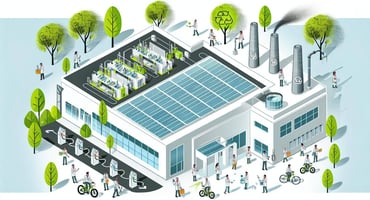Sustainable Practices in Pharmaceutical Manufacturing
Sustainability has become a buzzword in every industry, and the pharmaceutical manufacturing sector is no exception. As an Operations Director in a pharmaceutical manufacturing facility, you understand the crucial role your organization plays in ensuring the health and well-being of individuals worldwide. It is now more important than ever to embrace sustainable practices in pharmaceutical manufacturing.
This blog aims to guide you on the path to sustainable manufacturing by exploring the integration of PlanetTogether, an advanced production planning and scheduling software, with leading ERP, SCM, and MES systems like SAP, Oracle, Microsoft, Kinaxis, and Aveva. By harnessing the power of these integrated systems, you can streamline operations, reduce waste, cut costs, and ultimately contribute to a healthier planet.

Sustainability in Pharmaceutical Manufacturing
Let's understand why sustainability is a vital concern in the pharmaceutical industry.
Environmental Responsibility: Pharmaceutical manufacturing is resource-intensive, with substantial energy consumption and waste generation. Embracing sustainable practices helps reduce the environmental impact, leading to cleaner air and water and a healthier ecosystem.
Cost Reduction: Sustainable manufacturing practices can significantly reduce operational costs by optimizing resource utilization, minimizing waste, and improving energy efficiency.
Regulatory Compliance: Stringent regulations in the pharmaceutical industry require companies to adhere to strict environmental and quality standards. Sustainability initiatives ensure compliance and reduce the risk of fines and penalties.
Enhanced Reputation: Embracing sustainability not only attracts environmentally conscious customers but also enhances your company's reputation as a responsible corporate citizen.


PlanetTogether: Revolutionizing Production Planning and Scheduling
PlanetTogether is an advanced production planning and scheduling software designed to optimize manufacturing processes. By leveraging artificial intelligence and machine learning algorithms, it can improve production efficiency, reduce lead times, and minimize production bottlenecks. But how can it be integrated with other critical systems to enhance sustainability in pharmaceutical manufacturing?
Integration with SAP
SAP is a powerhouse in the ERP world, offering comprehensive solutions for pharmaceutical manufacturers. Integrating PlanetTogether with SAP can provide the following benefits:
Real-time Data Sharing: Seamless integration allows for real-time data exchange between production planning in PlanetTogether and SAP's inventory management and procurement modules. This ensures accurate demand forecasting and efficient resource allocation.
Reduced Inventory Costs: By synchronizing production schedules with inventory levels, you can minimize overstocking and reduce carrying costs.
Improved Compliance: Integrated systems can help ensure compliance with Good Manufacturing Practices (GMP) and other regulatory requirements.
Integration with Oracle
Oracle's ERP solutions are widely adopted across industries, including pharmaceuticals. Integrating PlanetTogether with Oracle ERP offers advantages such as:
Demand Forecasting: Combining PlanetTogether's production planning capabilities with Oracle's demand forecasting tools helps align manufacturing processes with market demands, reducing excess production and waste.
Enhanced Visibility: Real-time synchronization allows you to monitor production progress and identify bottlenecks, enabling quicker response times to production challenges.
Better Quality Control: Integration with Oracle Quality Management ensures rigorous quality control throughout the manufacturing process.
Integration with Microsoft
Microsoft's ERP and productivity suite, Dynamics 365, can be integrated with PlanetTogether to boost sustainability:
Energy Efficiency: By aligning production schedules with energy-saving measures, you can reduce energy consumption and operational costs.
Collaboration: Microsoft Teams integration allows cross-functional teams to collaborate seamlessly, addressing sustainability challenges collectively.
Reporting and Analytics: Power BI integration enables in-depth sustainability reporting and analysis, helping you identify areas for improvement.
Integration with Kinaxis
Kinaxis RapidResponse, a supply chain planning platform, can be integrated with PlanetTogether for holistic sustainability management:
Supply Chain Visibility: Align your production schedules with Kinaxis for end-to-end visibility into your supply chain, enabling better decision-making to reduce waste.
Risk Mitigation: Identify and mitigate supply chain risks that could disrupt operations or lead to resource wastage.
Continuous Improvement: Leverage Kinaxis's analytics to drive continuous improvement initiatives in your manufacturing processes.
Integration with Aveva
Aveva's Manufacturing Execution System (MES) can complement PlanetTogether for sustainable manufacturing:
Real-time Monitoring: Integrate PlanetTogether with Aveva's MES for real-time visibility into production operations, allowing you to make immediate adjustments to optimize sustainability.
Quality Assurance: Ensure that production processes are aligned with quality standards, reducing the likelihood of rework and waste.
Resource Efficiency: Aveva's MES can help you manage resources efficiently, from raw materials to equipment, reducing waste and costs.
Sustainability in pharmaceutical manufacturing is no longer an option; it's a necessity. As an Operations Director, integrating PlanetTogether with ERP, SCM, and MES systems can be your key to achieving sustainability goals while maintaining operational efficiency and compliance.
By harnessing the power of these integrated systems, you can optimize resource utilization, reduce waste, cut costs, and contribute to a healthier planet. As you embark on your sustainable journey, remember that the integration process should be tailored to your organization's specific needs and sustainability objectives.
Embrace the opportunity to lead your pharmaceutical manufacturing facility towards a more sustainable future, one integrated system at a time.
Are you ready to take your manufacturing operations to the next level? Contact us today to learn more about how PlanetTogether can help you achieve your goals and drive success in your industry.